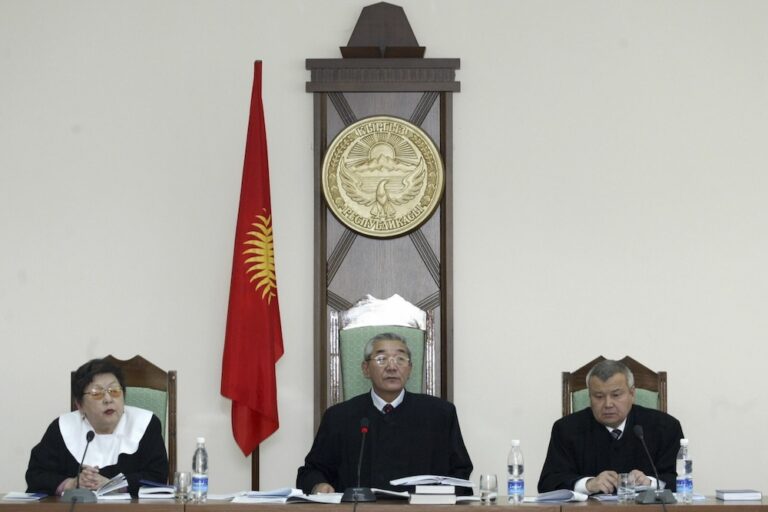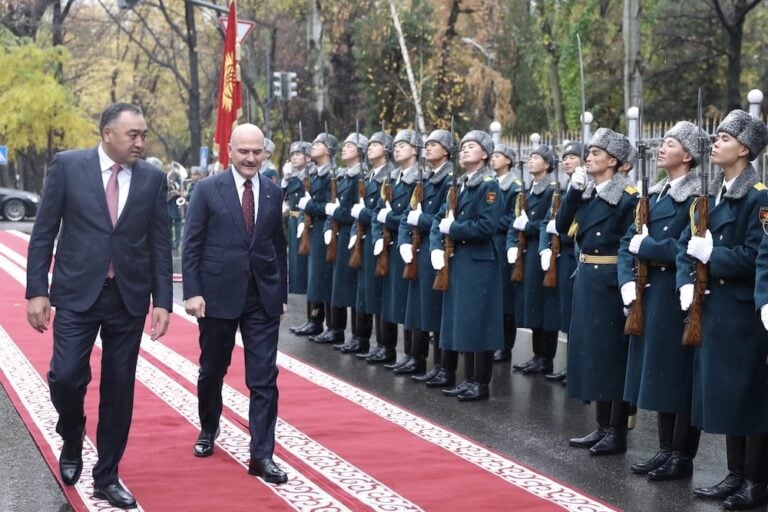"The Kyrgyz authorities should drop criminal cases of 'war propaganda' and 'calls to mass disorder' initiated against several independent media outlets," eight human rights groups said.
This statement was originally published on hrw.org on 16 January 2024.
Free detained journalists, return confiscated equipment, allow reporting without censorship
The Kyrgyz authorities should drop criminal cases of “war propaganda” and “calls to mass disorder” initiated against several independent media outlets, eight human rights groups said today in a joint statement.
The media outlets facing charges include 24.KG, Temirov Live, Ayt Ayt Dese, Alga Media, Archa Media, and Politklinika, all in clear retaliation for their independent reporting. In an escalation of pressure on independent media, on January 15 and 16, 2024, Kyrgyz law enforcement agents and security services carried out early morning raids targeting media outlets and reporters. The authorities should stop intimidating and harassing journalists, and allow them to carry out their work without obstruction.
The groups issuing that statement are Human Rights Watch, Civil Rights Defenders, International Partnership for Human Rights (IPHR), Norwegian Helsinki Committee, People in Need, Helsinki Foundation for Human Rights, and International Federation for Human Rights and World Organisation Against Torture within the framework of the Observatory for the Protection of Human Rights Defenders.
On January 16, Kyrgyz police raided the homes of at least 10 current and former journalists with Temirov Live, Ayt Ayt Dese, Alga Media, Archa Media, and Politklinika; confiscated equipment; and detained several of them for interrogation, Kyrgyz media reported. According to 24.KG, Kyrgyz police said in a statement that the raids and detentions were part of a criminal investigation under Article 278.3 of the Criminal Code, which penalizes “calls to disobedience and mass riots.”
The Interior Ministry’s press service told local media that the agency opened the investigation after linguistic experts, commissioned by the police in late December 2023, allegedly concluded that some publications contained signs of such calls. It is unclear what publications these charges concern. The Criminal Code provision is vaguely worded and has repeatedly been used to initiate criminal charges against critics of the authorities. It provides for penalties up to eight years in prison.
On January 15, the Kyrgyz State Committee on National Security raided the newsroom in Bishkek of the independent news agency 24.KG, confiscated equipment and detained the outlet’s director Asel Otorbayeva and its two chief editors, Makhinur Niyazova and Anton Lymar, holding them for nearly four hours for interrogation. The security agency also confiscated mobile phones of other 24.KG reporters, sent them home, and sealed the office, local media reported. A post on X, formerly Twitter, on January 15 from the 24.KG account said: “24.KG newsroom is being raided. GKNB agents are in the premises. [Our] Lawyers are barred entry.”
Citing the security agency’s press service, Kyrgyz media reported that the agency took actions against 24.KG in connection with a criminal case the agency had initiated on charges of “war propaganda” under article 407 of the Kyrgyz Criminal Code. The agency said that the Pervomayski District Court in Bishkek had approved the raid. This criminal provision carries a sentence of heavy fines or imprisonment of up to seven years with a ban on carrying out professional activities for up to three years.
Before being taken for interrogation, Niyazova told journalists that the criminal case against 24.KG was related to its reporting on the war in Ukraine. Upon their release, Niyazova and her colleagues told journalists that they had been required to sign a non-disclosure agreement for the duration of the criminal investigation, so were unable to share any further information.
The outlet’s lawyers reported being denied access to the 24.KG office during the raid, as well as to the 24.KG representatives during their interrogation on security agency premises.
The actions against 24.KG and others come in the context of a worsening campaign against free speech in Kyrgyzstan and are likely to reinforce a climate of fear among independent media outlets, the groups issuing the joint statement said.
In the last few years, independent media and journalists, bloggers, and others critical of the Kyrgyz government’s policies have faced increasing pressure, including politically motivated criminal cases, arrests, and imprisonment. The websites of independent news sites have been arbitrarily blocked and the authorities have attempted to close down media organizations because of their independent reporting, such as in an ongoing court case against Kloop and an earlier case against the Kyrgyz service of Radio Free Europe/Radio Liberty, in which its bank account was frozen.
Previously another independent outlet, Kaktus Media, came under investigation on charges of war propaganda because of its reporting on hostilities at Kyrgyzstan’s border with Tajikistan. Bolot Temirov, a journalist at Temirov Live whose wife and colleagues were targeted by the raids on January 16, was stripped of his citizenship and deported because of his outlet’s investigations into high-level corruption.
Freedom of expression in Kyrgyzstan will further deteriorate if a repressive draft media law, which is currently under consideration in parliament, is adopted. The draft law would significantly expand government control over the media, and grant the authorities wide powers to deny media outlets registration, obstruct their work, and close them down. The draft media law has been severely criticised by the media community, human rights groups and international human rights experts. On January, 15, the parliamentary committee on international affairs postponed its consideration of the draft law, saying it needed additional revisions.
The Kyrgyz authorities need to take immediate and decisive steps to bring the country’s respect for press freedom in accordance with its international obligations, in particular the International Covenant on Civil and Political Rights, the groups said. They should immediately cease their repressive actions against independent media outlets and journalists, and allow them to report on events in the country and the rest of the world without fear of retribution. The authorities should also refrain from pursuing the draft media law in its current format. The Kyrgyz authorities’ respect for freedom of expression should be an important consideration by the EU and other actors seeking closer engagement with the country.



